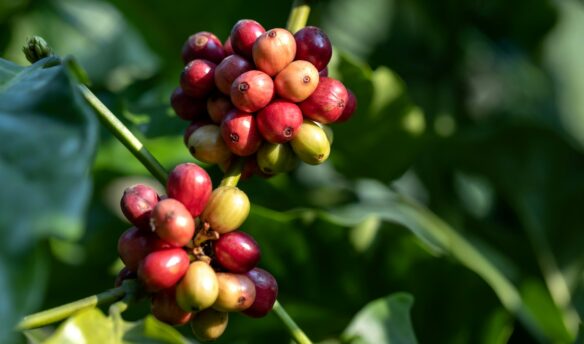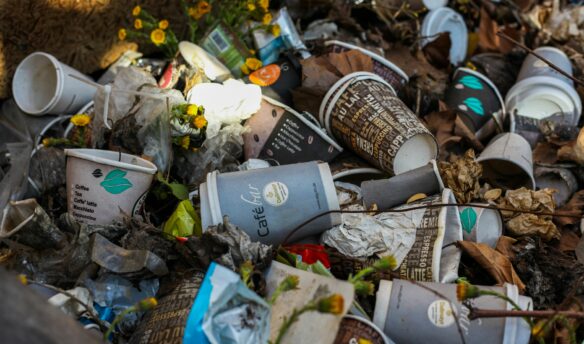Could a rediscovered coffee species save the industry? Could a tiny wasp save Hawaiian coffee? Could drinking coffee save your hips?
‘The Re-Emergence of Liberica Coffee as a Major Crop Plant’ – via Nature
The coffee industry is seeking ways to adapt to the realities of climate change. As researchers and producers have studied the effect of a warming planet and unpredictable weather patterns on coffee, three main options have emerged:
- move farms to more suitable locations
- adapt farming practices
- develop new, more resilient coffee species
Researchers in the UK and Uganda have been investigating this third option, and they believe they have found a candidate. Their report was published last week in the journal Nature.
In the late 1800s, producers in Southern and Southeast Asia were plagued by the rapid spread of coffee leaf rust that was decimating harvests of Arabica coffee. They turned to Liberica (Coffea liberica), a coffee species indigenous to tropical West and Central Africa that was robust and high-yielding.
By the end of the nineteenth century, Liberica was so popular that some thought it might replace Arabica as the main cultivated coffee species. Liberica was hardier and able to grow at lower altitudes and in warmer temperatures than its more delicate relation.
That changeover never happened, partly due to Liberica’s downsides: an uncharacteristic flavor profile, poor quality, and processing difficulties. At the same time, robusta, another coffee species even more resistant to disease, began rising in popularity. Robusta beans also lacked a distinct flavor profile, making them easier to blend with Arabica and more preferable than Liberica.
Today’s reappraisal of Liberica is focused chiefly on a subvariety, excelsa, which was discovered in the early 20th century. Excelsa is notable due to its high yield and ease of processing. Compared to Liberica’s large fruit and thick skin and pulp, excelsa’s smaller fruit size means processing stations can use existing equipment, and the cherry’s thinner pulp means drying is more uniform.
Excelsa also appears to be more resistant to coffee leaf rust and other diseases that afflict coffee plants, which have been exacerbated by climate change. Excelsa is now harvested on 200 farms in Uganda and is also grown in Sudan, both areas where the plant is indigenous. Notably, the uptake of excelsa has been farmer-driven instead of influenced by outside actors.
“In a changing climate,” the authors write, “Liberica offers (at the very least) the potential to grow commercially viable, and perhaps high-value, coffee under much warmer conditions (and at lower elevations) than Arabica and may offer improved climate resiliency over robusta.”
‘Tiny Wasps Could Help Save Hawaii’s Coffee Industry’ – via Honolulu Star-Advertiser
Officials in Hawaii are seeking public comment on a plan to release parasitic wasps to combat an infestation of coffee berry borer beetles that has devastated the state’s coffee crops.
The larvae of the tiny wasps, originally from Africa, feed on the adult borer beetles before they can destroy coffee trees. Wasps have been used in other locations around the world to help protect coffee crops.
The University of Hawaii College of Tropical Agriculture and Human Resources devised the plan to protect coffee plants in collaboration with the US Department of Agriculture and the state Department of Agriculture. Scientists observed the wasps and concluded that they don’t sting people and are “unlikely to cause any harm to Hawaii’s environment.”
According to Suzanne Shriner, president of the Kona Coffee Farmers Association, the berry borer beetle is estimated to have destroyed 30% of Hawaii’s coffee crop this year. “It’s been a hard year on the farm,” Shriner said. “Most farmers think the wasp is the favorable option.”
Read the full story here (or here via Yahoo! News).
More News
‘Coffee Consumption Seen Rising Only Modestly in Next Few Years’ – via Bloomberg
‘Former D.C.-Area Coffee Shop Owner Guilty in Credit Card and Identity Theft Scheme’ – via Daily Coffee News
‘ASCA to Postpone 2023 Australian Barista and Brewers Cup Competitions’ – via BeanScene
‘Twitter Is Auctioning Off A Whole Lot Of Coffee Equipment’ – via Sprudge
‘NCBA CLUSA to Lead $15 Million Climate-Smart Coffee Program in Puerto Rico’ – via Daily Coffee News
‘Brazil Coffee Exports Jump 19% in Nov. as Shipping Improves’ – via Nasdaq
‘The Fourteenth Annual Sprudgie Award Finalists’ – via Sprudge
‘ASEAN Coffee Federation Releases the ASEAN Flavour Sphere’ – via Daily Coffee News
‘Turns Out Coffee also Makes Semiconductors Work Faster Too’ – via Techradar Pro
The Week in Coffee Unionizing
- Workers at two Chicago locations of La Colombe Coffee have announced their intent to unionize following the recent announcement from two La Colombe stores in the Washington, DC, area. This move adds to the expanding wave of organizing within the Chicago specialty coffee scene after Intelligentsia and Colectivo workers voted to unionize earlier this year.
- Starbucks workers at 100 stores staged a three-day strike over the weekend, with over 1,000 baristas participating. The action marked the second strike in a month after the Red Cup Rebellion in November and was the longest in the year-old Starbucks Workers United campaign. “They’re doubling down on their union-busting, so we’re doubling down too. We’re demanding fair staffing, an end to store closures and that Starbucks bargain with us in good faith,” said barista and organizer Michelle Eisen.
- Employees at Intelligentsia Coffee in Chicago have ratified their first union contract, winning a two-year deal that includes wage increases, job protections, and mandated paid breaks. The agreement covers 31 workers at Intelligentsia’s five Chicago cafes and was ratified in less than two months. Meanwhile, the same union, the International Brotherhood of Electrical Workers, remains in negotiations with Colectivo Coffee more than a year after workers voted to form a union.
The Week in Corporate Coffeewashing
The World Wildlife Fund is evaluating the plastic waste-tackling credentials of some of the world’s biggest corporations, including Starbucks, Keurig Dr Pepper, McDonald’s, and Costa Coffee’s parent company Coca-Cola.
The latest report, measuring progress in 2020 and 2021 for the eight companies participating in WWF’s ReSource: Plastic program, observed incremental improvements such as increased use of recycled plastic. However, it also found the total tonnage of plastic used by the companies grew by more than 5% in 2021, with Coca-Cola using the most.
The ReSource: Plastic program was set up in 2019 by WWF to encourage large corporations to measure and reduce their use of plastics across the supply chain.
For most companies, their plastic intensity—the amount of plastic they produced relative to their sales—declined during the reporting timeframe. For Starbucks and McDonald’s, it increased. While lauding its plastic-reduction goals, Starbucks at least admitted that “we still have work to do to meet our goals and decouple our plastic usage from our business growth,” according to Chief Sustainability Officer Michael Kobori.
While progress is taking place—the report shows that the amount of PVC, polystyrene, and components too small to recycle being produced by program participants is decreasing—it’s hard to imagine how a global multinational corporation can completely “decouple” from plastic usage.
Is Coffee Good For You?
A new observational study from the UK has found that drinking coffee can reduce hip fractures in women.
The study, from the University of Leeds and published in the journal Clinical Nutrition, used data from the UK Women’s Cohort Study, which recruited more than 26,000 participants between 1995 and 1998. Participants self-reported dietary intakes throughout the study and 822 hip fractures were recorded over a median follow-up time of 22.3 years.
Results showed that every additional cup of tea or coffee per day was associated with a 4% lower risk of hip fracture during the study period, described in the announcement as “a surprise twist.”
The researchers hypothesize that coffee (and tea, which was also found to be beneficial) contains biologically active compounds called polyphenols and phytoestrogens, which may help to maintain bone health.
However, they also stress that more study is needed and other possible explanations exist. “We still need to know more about how these drinks could affect bone health, but it might be through promoting the amount of calcium present in our bones,” said Professor Janet Cade, who supervised the research.
Beyond the Headlines
‘Why Is Howard Schultz Taking This So Personally?’ by Noam Scheiber and Julie Creswell
‘Coffee Presents To Buy That Aren’t Starbucks Gift Cards’ by Ashley Rodriguez
‘The Turbulent History of Tully’s Coffee’ by Fionn Pooler
Coffee News Club is written by Fionn Pooler and the Fresh Cup editorial team. We’re taking a break from the news club for a few weeks, but we’ll have a roundup of our favorite stories out next week and a brand new Coffee News Club on January 9th, 2023!
















